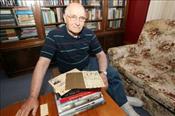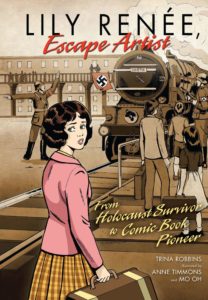
Holocaust survivor Guenther Goldsmith talks to Missouri University students about his experience fleeing Nazi Germany via the Kindertransport, in Ellis Library on the MU campus.
I was put on a train with 10 other children in Berlin to Spain and then got on a boat and four weeks later arrived in New York, Goldsmith said. “The next day I was on my way to St. Louis.” More typically, Kindertransports were sent to England. A few Jewish children were sent to the United States because their families had made arrangements for them to live with families there. Goldsmith arrived in St. Louis in 1941, at the age of 15. He moved in with an uncle and began high school.
There are many stories about good people and organizations risking their lives to help Jewish families survive the atrocities of Nazism. Here is one of those stories. In the months between the Kristallnacht Pogrom of November 9-10, 1938, and the start of World War II, nearly 10,000 children were sent out of Nazi Germany, Austria, Poland, and Czechoslovakia to safety in Great Britain. Their parents remained behind.

John Schnellenberg with his parents’ passports. Mr Schnellenberg was three when he arrived in New Zealand in 1939.
Suitcases belonging to two Jewish children sent by their parents from Nazi Germany to England, and eventually to Masterton, will be unveiled at the Holocaust Centre of New Zealand. The two children “escaped the horrors of the camps” via Kindertransport, sent by their parents to England and eventually settled with relatives in Masterton in 1946. They never saw their parents again.
Malka and Abraham Jura faced a Solomonic decision in late 1938, as the Nazis were tightening the vise on the Jews of Vienna. The couple hoped to send their three daughters to safety but were able to wrangle only one place on the Kindertransport ferrying a limited number of Jewish children to London. After much agonizing, the Juras decided to give the spot to 14-year-old Lisa, a remarkable piano prodigy.
t was more than 50 years after the Kindertransport that Margaret first heard the term for the movement that saved her mother. Today, she has an even better understanding of her mother’s past and an appreciation for her resiliency. “My mother said, ‘We always looked forward, never back, we needed to find hope for the future.’ It was hope that kept them moving forward, even when they came to Canada as immigrants and tried to get ahead.”
The forgotten story of how the people of Sandwich played a key role in saving thousands of men from certain death at the hands of the Nazis is to be featured in a BBC TV show on Monday evening Jan. 23. In recounting the stories of love and loss, the programme tracks down men and women of the time to discover how the locals took the people of another country and culture to their hearts. The show managed to track down many of the Kitchener Camp veterans who still survive today.
Sacred Heart University is the recipient of a collection of books on the holocaust from Dr. Geoffrey and Renée Hartman. The couple amassed a collection of scholarly works with their work on the Holocaust Survivors Film Project. Dr. Hartman was born in Frankfurt, Germany in 1929 and was placed on Kindertransport to England in 1939. Renée Hartman was deported as a 10 year old from Slovakia in 1944 to the Bergen Belsen concentration camp where she and her younger sister were liberated in 1945.
A KNIGHTED jewish refugee, a young Auschwitz visitor and a High Commissioner are among guest speakers at the annual Holocaust Memorial Day Service in Hendon this Sunday. The day’s theme is Speak Up, Speak Out, admission is free and all members of the public are invited to attend.
Few lives so encapsulated the mammoth historical and political changes during 20th Century Europe as that of Claire Rauter, who has died aged 87. As a child she fled Nazi persecution, in her adolescence she swapped ideas with Londons intelligentsia, and in adulthood she made it her life’s work to bring Steiner’s humanistic educational approach to the masses. Born in Vienna in 1924 to Jewish parents, Mrs Rauter and her younger brother Freddy boarded a train out of Austria 15 years later.

Robbin’s young-adult graphic novel chronicles Renee’s childhood before she became a comic artist.
Robbins’ new book is “Lily Renee: Escape Artist.” The true story of Lily Renee, a girl who escaped to Britain via kindertransport after Nazi Germany annexed Austria, worked at a hospital during the blitz and was reunited with her parents in the US. In her teens and twenties, Renee worked as a comic book artist. Many of the comics she illustrated involved fighting the Nazis she had escaped and on paper she was able to tell the stories of strong women fighting the Nazi threat in their own way.
On Wednesday evening Thomas Marks saw Andrew Motion, AS Byatt and Ian Bostridge celebrate WG Sebald, the great German author of Vertigo and Austerlitz, who died in a car crash a decade ago.
PRAGUE (JTA) – On the first night of Chanukah, I stood in the splendid reception hall of the U.S. ambassador’s residence in Prague as the ambassador lit the first candle in a gilded menorah. …Havel had been extremely important. Not just with his condemnation of anti-Semitism, but with the active role he played in addressing issues such as restitution of Jewish property and in awarding one of the highest state honors to Nicholas Winton, who organized the Czech kindertransport.
Frieda Korobkin can’t recall the last words her father spoke before she and her siblings boarded the Kindertransport but she does remember the Nazis attacking him on the way. Her father was Rabbi Nissan Stolzberg and Nazi soldiers had cut off his beard in front of his 4 young children as he walked them to the train station in Vienna in 1938. Frieda Korobkin spoke to about 250 people Sunday at Beth Avraham Yoseph Synagogue of Toronto, where her son Daniel Korobkin is senior rabbi.
Lily Renee, Escape Artist: From Holocaust Survivor to Comic Book Pioneer This is quite a remarkable little book, by quite an artist-writer duo, on quite a subject. The daughter of a Yiddish journalist and one of the founders of Underground Comix in the late 1960s, Trina Robbins was also a central figure in women’s comics in the 1970s-1990s. The Lily Renee story, is firstly about the discrimination and persecution suffered by Renee in pre-war Vienna, and her escape via Kindertransport.
On Wednesday in Hoek van Holland, in sight of the gangway where over 70 years ago they embarked for England and freedom, gathered tens of Kinder from all over the world. They had come for the unveiling of a statue in commemoration of the Kindertransport. The bronze figures of children with their backpacks and cases relate closely to those previously fashioned by the same artist, Frank Meisler, himself a Kind, in Berlin, Gdansk and at Liverpool Street station.
Injustice was a theme in Conot’s early life that he rarely spoke about but which he repeatedly visited in his books, his daughter said. A native of Austria, he was a child of the Kindertransport. In 1938, when he was 9, he climbed aboard a train — and never saw his parents again. His father, a lawyer, died in the Theresienstadt concentration camp, and his mother, a professional violinist, perished at Auschwitz, Conot’s family said.
“Nicky’s Family,” a documentary film making its debut next month at the Holocaust Memorial Center Zekelman Family Campus in Farmington Hills, opens with two girls peeping through a porthole of a ship leaving eastern Europe, bound for England. The documentary will be shown Dec. 4 as part of the opening of the Holocaust Memorial Center’s newest exhibit, “The Last Goodbye,” which highlights the rescue of the children through the program known as Kindertransport.
Winnipeg – A community-wide Kristallnacht commemoration was held, with a nearly full house turnout last Wednesday. On this same date, in 1938, mobs took to the streets in Germany, Austria, and Sudetenland, attacking Jews in the street, their homes, workplaces and synagogues. Vera Fast, local author and noted historian, recently published Children’s Exodus – A History of the Kindertransport. At the commemoration, she presented The Kindertransport and Beyond event.
Gratz College’s 32-year-old Holocaust Oral History Archive contains interviews with more than 900 survivors of the Shoah, amounting to thousands of hours of testimony. The Melrose Park academic institution has entered into an agreement with Yad Vashem — Israel’s official national Holocaust memorial and one of the world’s leading research institutions on the Shoah — to back up the thousands of hours of recordings in a digital format.
November 9th is an important date in German history. It marks the day that the Berlin Wall fell, 20 years ago this month. The reason it’s not a national holiday in Germany, is that the night of November 9th also marks a much darker anniversary: Kristallnacht, the so-called “Night of Broken Glass.” Hans Riess, an 88 year-old resident of Wesley Hills, NY remembers the date well. He was born in Berlin in 1921. On November 9th, 1938 he was 17 years old.